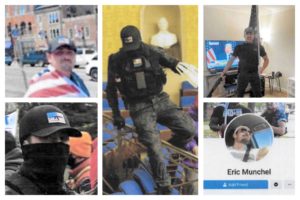
A Nashville man may be released from jail before his trial for federal charges related to the storming of the U.S. Capitol earlier this month. A Tennessee judge decided Eric Munchel does not pose a threat to the community and is likely to attend his court hearings.
But a federal judge in D.C. overruled his decision Sunday and ordered that Munchel travel to Washington for further proceedings regarding his pretrial detention. Munchel remains in custody for now, while his case is under review.
Friday’s hearing revealed the challenge that prosecutors will likely face as they try to hold accountable individual men — or women — among a mob.
Munchel, who has been referred to as “zip tie guy” because photos showed him carrying plastic handcuffs, has been ordered to stay with a close friend and her mother while he awaits trial for conspiracy, civil disorder, entering a restricted building and engaging in disorderly conduct that disrupted government business.
In the meantime, the 30-year-old Nashville resident will be on house arrest, except to go to work or other essential appointments, and will have to report to supervising officer at least once a week.
“Certainly the court’s heard evidence in this case that would suggest that he engaged in conduct that is, at its core, dangerous,” U.S. Magistrate Judge Chip Frensley said in a hearing Friday. “The issue, though, is whether or not there are conditions that I can impose that can reasonably assure the safety of the community. I believe that the government’s requested conditions in this case are conditions that will reasonably assure the safety the community. I have no reason to believe that Mr. Munchel won’t comply.”
Munchel’s case provides a glimpse into the challenges federal law enforcement officials are likely to face as they attempt to prosecute more than 100 people involved in the riot on Jan. 6.
 WPLN News via Department of Justice
WPLN News via Department of JusticeVolunteers on social media sent photos and screenshots that the FBI used to find Eric Munchel of Nashville.
The problem isn’t a shortage of evidence regarding his involvement in the riot.
FBI agents have viewed an approximately 12-minute-long video captured on Munchel’s phone, which shows him and his mother, Lisa Eisenhart, inside the Capitol. They’ve found photos of him with flex cuffs in his hands and a Taser on his hip inside the Senate chambers. They’ve seen a photo of him smiling in front of an image of former President Donald Trump on TV while holding a rifle. They’ve also uncovered more than a dozen firearms and hundreds of rounds of ammunition at Munchel’s home, although there’s no evidence that he had any of those weapons with him at the Capitol.
Even so, prosecutors failed to convince a Nashville judge that he was dangerous during a hearing that lasted more than five hours. Entering the Capitol in tactical gear and seizing a set of wrist restraints concerned the judge, but he said that proof regarding Munchel’s intentions that day was “inconsistent” and that it wasn’t clear he intended to harm anyone.
As Frensley weighed his options, a similar line of questioning came up time and again: Should Munchel be held responsible for the actions of others in the mob that day, even if there’s no evidence that he committed any violence himself? And would he have even entered the Capitol if it hadn’t been for the mob?
These questions are likely to arise in other cases as well, as judges try to make sense of how a crowd of protesters morphed into an unruly mob, with some smashing windows and assaulting police officers while others posed for photos and snuck out with souvenirs from the congressional building. Judges will also have to consider how accountable individuals are for their individual actions within a mass.
For instance, video discussed during the hearing allegedly shows Munchel and his mother in the vicinity of a group of people attacking police officers, but it doesn’t show them taking part themselves. And at another point in the footage, Munchel reportedly apologizes to officers and expresses his support.
“One thread that seems to run through, not withstanding Mr. Munchel’s conduct here, is his apparent respect for law enforcement,” Frensley said. “It’s a little bit counterintuitive, because, on the one hand, his actions are an absolute disrespect of law enforcement. But on the other hand, the videos show him speaking with law enforcement in respectful ways, communicating his support of law enforcement. That’s consistent with his prior actions and prior statements.”
In addition, Munchel’s attorney pointed out that he didn’t appear to commit any vandalism — she says video footage actually shows him telling others not to damage any property — but he did walk through a door that others had violently forced open before he arrived.
Munchel’s motives and the extent of his involvement in the riot are still under investigation, as is the case for dozens of others across the country. But Frensley said the dangerous behavior at the Capitol, which caused injuries, multiple deaths and threatened democracy, will have its day in court.
“Mr. Munchel is entitled to his opinions. It’s protected under the Constitution. He has a right to hold those beliefs. He has a right to state those beliefs,” the judge said. “He doesn’t have a right to do what he did on January the Sixth. Now, that’s for another day.”
After the D.C. judge overruled Frensley’s decision, Munchel will remain in custody while his case is under review.
Update: The headline and story was updated on Sunday at 3:30 p.m. to reflect the federal judge’s decision that Eric Munchel must remain in custody for now. Samantha Max is a Report for America corps member.

